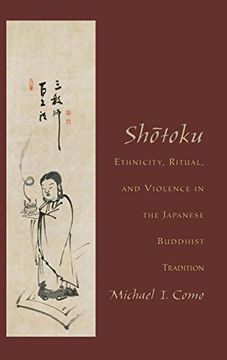Share
Shotoku: Ethnicity, Ritual, and Violence in the Japanese Buddhist Tradition (in English)
Michael I. Como (Author)
·
Oup Usa
· Hardcover
Shotoku: Ethnicity, Ritual, and Violence in the Japanese Buddhist Tradition (in English) - Michael I. Como
$ 84.00
$ 114.00
You save: $ 30.00
Choose the list to add your product or create one New List
✓ Product added successfully to the Wishlist.
Go to My WishlistsIt will be shipped from our warehouse between
Tuesday, May 14 and
Wednesday, May 15.
You will receive it anywhere in United States between 1 and 3 business days after shipment.
Synopsis "Shotoku: Ethnicity, Ritual, and Violence in the Japanese Buddhist Tradition (in English)"
Prince Shotoku (573?-622?), the purported founder of Japanese Buddhism, is widely referred to as Japan's first national hero. The cult that grew up around his memory is recognized as one of the most important phenomena in early Japanese religion. This book examines the creation and evolution of the Shotoku cult over the roughly 200 years following his deatha period that saw a series of revolutionary developments in the history of Japanese religion. Michael Como highlights the activities of a cluster of kinship groups who claimed descent from ancestors from the Korean kingdom of Silla. He skillfully places these groups in their socio-cultural context and convincingly demonstrates their pivotal role in bringing continental influences to almost every aspect of government and community ideology in Japan. He argues that these immigrant kinship groups were not only responsible for the construction of the Shotoku cult, but were also associated with the introduction of the continental systems of writing, ritual, and governance. By comparing the ancestral legends of these groups to the Shotoku legend corpus and Imperial chronicles, Como shows that these kinship groups not only played a major role in the formation of the Japanese Buddhist tradition, they also to a large degree shaped the paradigms in terms of which the Japanese Imperial cult and the nation of Japan were conceptualized and created. Offering a radically new picture of the Asuko and Nara period (551794), this innovative work will stimulate new approaches to the study of early Japanese religion focusing on the complex interactions among ideas of ethnicity, lineage, textuality, and ritual.
- 0% (0)
- 0% (0)
- 0% (0)
- 0% (0)
- 0% (0)
All books in our catalog are Original.
The book is written in English.
The binding of this edition is Hardcover.
✓ Producto agregado correctamente al carro, Ir a Pagar.

